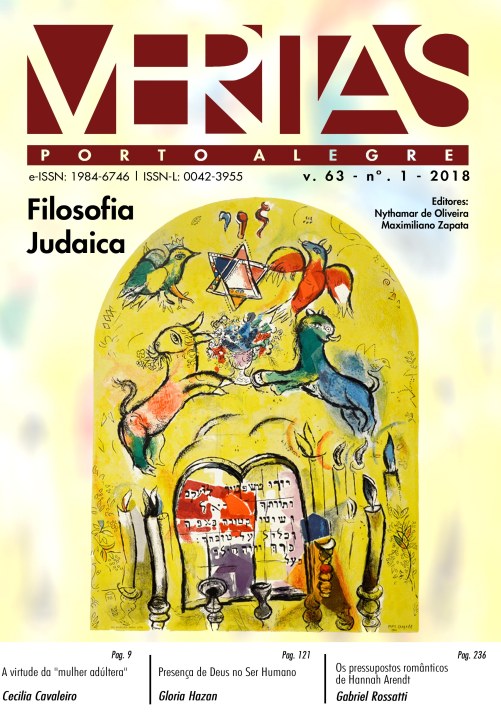Victor Klemperer: the language of evil and the nazification of German society
DOI:
https://doi.org/10.15448/10.15448/1984-6746.2018.1.29499Keywords:
Nazism, language, biopolitics, daily life, fanaticism, Jewish condition.Abstract
This paper contextualizes Nazism as a project of degradation of human multiplicity from the instrumentalization of the German language and consequently of language as a human experience. Such contextualization begins by presenting the widely known projects of Nazism, which are given in the shadow of Auschwitz, and then begin with the analysis of the observations of Victor Klemperer on the application of LTI (Lingua Tertii Imperii) in German society in the period that involved between the wars and the end of World War II, precisely in the city of Dresden, where Klemperer lived and rethought his Jewish condition. Through strategic use of language, Nazism intervened in the habits of German society, which implied popularly adherence to the ideology of the Third Reich, as well as provoked the legitimation of the reproduction of evil in that society as a perverted project of citizenship. This results in a biopolitical understanding of language, insofar as Nazism is recognized as a doctrine of fanaticism.Downloads
References
ADORNO, Theodor W. “La jerga de la autencidad”. In: Obra completa. Vol. 6. Tradução de Alfredo Brotons Muñoz. Madrid: Akal, 2005.
____________. Minima moralia. Tradução de Luiz Educardo Bicca. 2ª edição. São Paulo: Ática, 1993.
AGAMBEN, Giorgio. Homo Sacer: o poder soberano e a vida nua I. Tradução de Henrique Burigo. 2ª edição. Belo Horizonte: Ed. UFMG, 2010.
AMÉRY, Jean. Além do crime e castigo: tentativas de superação. Tradução de Marijane Lisboa. Rio de Janeiro: Contraponto, 2013.
ARENDT, Hannah. Eichmann em Jerusalém: um relato sobre a banalidade do mal. Tradução de José Rubens Siqueira. São Paulo: Companhia das Letras, 1999.
ASCHHEIM, Steven E. Scholem, Arendt, Klemperer: Intimate Chronicles in Turbulent Times. Bloomington/Indianapolis: Indiana University Press, 2001.
FREUD, Sigmund. “O inquietante”. In: Obras completas (vol. 14). Tradução de Paulo César de Souza. São Paulo: Companhia das Letras, 2010.
____________. O mal-estar na cultura. Tradução de Renato Zwick. Porto Alegre: L&PM, 2010.
GIRARD, René. O bode expiatório. Tradução de Ivo Storniolo. São Paulo: Paulus, 2004.
GUINSBURG, J.; TAVARES, Z. (orgs.). Quatro mil anos de poesia. Tradução de Modesto Carone. São Paulo: Perspectiva, 1969.
HORKHEIMER, Max; ADORNO, Theodor W. Dialética do esclarecimento. Tradução de Guido de Almeida. Rio de Janeiro: Jorge Zahar, 1985.
KLEMPERER, Victor. LTI: a linguagem do Terceiro Reich. Tradução de Miriam Bettina Paulina Oelsner. Rio de Janeiro: Contraponto, 2009.
LEVI, Primo. É isto um homem? Tradução de Luigi Del Re. Rio de Janeiro: Rocco, 1988.
NEGRI, Antonio. “El monstruo político. Vida desnuda y potencia” in: GIORGI, Gabriel; RODRÍGUEZ, Fermín (comps.). Ensayos sobre biopolítica: excesos de vida. Buenos Aires: Paidós, 2007, p. 93-139.
NESTROVSKI, Arthur; SELIGMANN-SILVA, Márcio (orgs.). Catástrofe e representação. São Paulo: Escuta, 2000.
ORWELL, George. 1984. Tradução de Wilson Velloso. 8ª edição. São Paulo: Companhia Editora Nacional, 1975.
SANTOS, Marcelo Leandro dos. “El empobrecimento de las narrativas humanas en la contemporaneidade, a partir de una lectura de Walter Benjamin” in GONZÁLES, Diana M. Muñoz (editora). ¿El fin del hombre?: Humanismo y antihumanismo en la filosofía contemporánea. Bogotá: Editorial Bonaventuriana, 2016. (Colección humanismo y persona; 3), p. 51-71.
____________. “Primo Levi: escrever e sobreviver após Auschwitz”. In: OLIVEIRA, Rejane Pivetta de (org.). Literatura para pensar e intervir no mundo. Porto Alegre: Ed. Uniritter, 2013, p. 125-147. ____________.
Constelação vital: da vida excitada à vida incitada um ensaio sobre o pensamento de Theodor W. Adorno. Tese de doutorado. Porto Alegre: PUCRS, 2010.
TAYLOR, Frederick. Dresden: Terça-feira, 13 de fevereiro de 1945. Tradução de Vítor Paolozzi. Rio de Janeiro: Record, 2011.
Downloads
Published
How to Cite
Issue
Section
License
Copyright
The submission of originals to Revista Veritas implies the transfer by the authors of the right for publication. Authors retain copyright and grant the journal right of first publication. If the authors wish to include the same data into another publication, they must cite Revista Veritas as the site of original publication.
Creative Commons License
Except where otherwise specified, material published in this journal is licensed under a Creative Commons Attribution 4.0 International license, which allows unrestricted use, distribution and reproduction in any medium, provided the original publication is correctly cited. Copyright: © 2006-2020 EDIPUCRS</p






